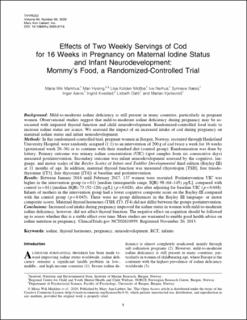| dc.description.abstract | Background: Mild-to-moderate iodine deficiency is still present in many countries, particularly in pregnant women. Observational studies suggest that mild-to-moderate iodine deficiency during pregnancy may be associated with impaired thyroid function and child neurodevelopment. Randomized-controlled food trials to increase iodine status are scarce. We assessed the impact of an increased intake of cod during pregnancy on maternal iodine status and infant neurodevelopment. Methods: In this randomized-controlled trial, pregnant women in Bergen, Norway, recruited through Haukeland University Hospital, were randomly assigned (1:1) to an intervention of 200 g of cod twice a week for 16 weeks (gestational week 20–36) or to continue with their standard diet (control group). Randomization was done by lottery. Primary outcome was urinary iodine concentration (UIC) (spot samples from six consecutive days) measured postintervention. Secondary outcome was infant neurodevelopment assessed by the cognitive, language, and motor scales of the Bayley Scales of Infant and Toddler Developmental third edition (Bayley-III) at 11 months of age. In addition, maternal thyroid function was measured (thyrotropin [TSH], free triiodothyronine [fT3], free thyroxine [fT4]) at baseline and postintervention. Results: Between January 2016 until February 2017, 137 women were recruited. Postintervention UIC was higher in the intervention group (n = 61) [median (interquartile range, IQR) 98 (64–145) μg/L], compared with control (n = 61) [median (IQR) 73 (52–120) μg/L] (p = 0.028), also after adjusting for baseline UIC (p = 0.048). Infants of mothers in the intervention group had a lower cognitive composite score on the Bayley-III compared with the control group (p = 0.045). There were no group differences in the Bayley III language- or motor composite scores. Maternal thyroid hormones (TSH, fT3, fT4) did not differ between the groups postintervention. Conclusions: Increased cod intake during pregnancy improved the iodine status in women with mild-to-moderate iodine deficiency, however, did not affect thyroid function. The negative effect on cognition should be followed up to assess whether this is a stable effect over time. More studies are warranted to enable good health advice on iodine nutrition in pregnancy. ClinicalTrials.gov NCT02610959. Registered November 20, 2015. | |
